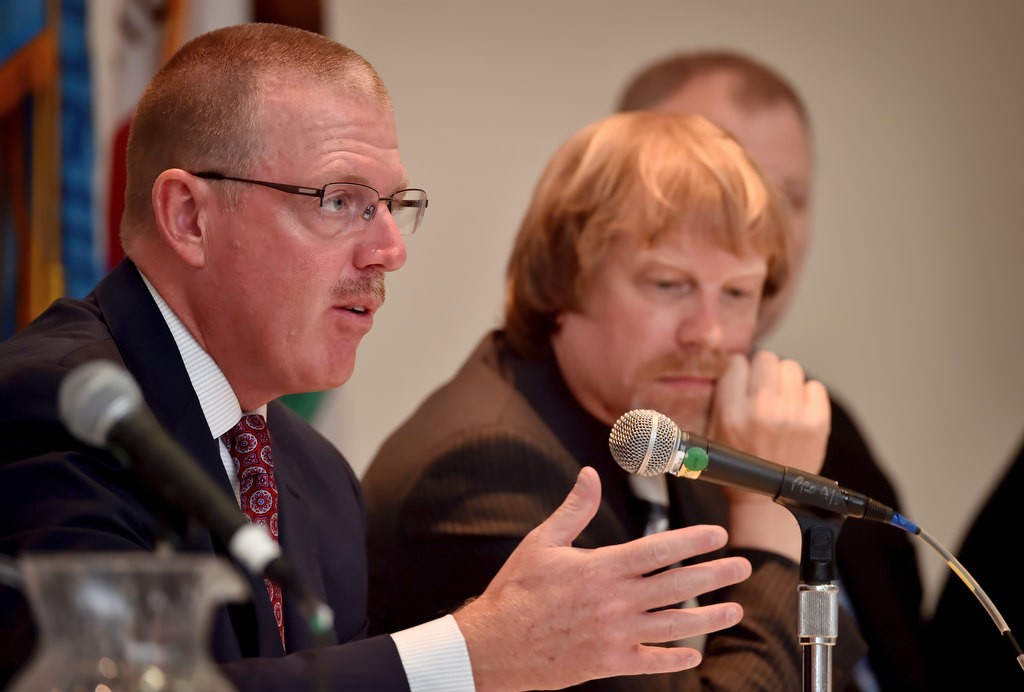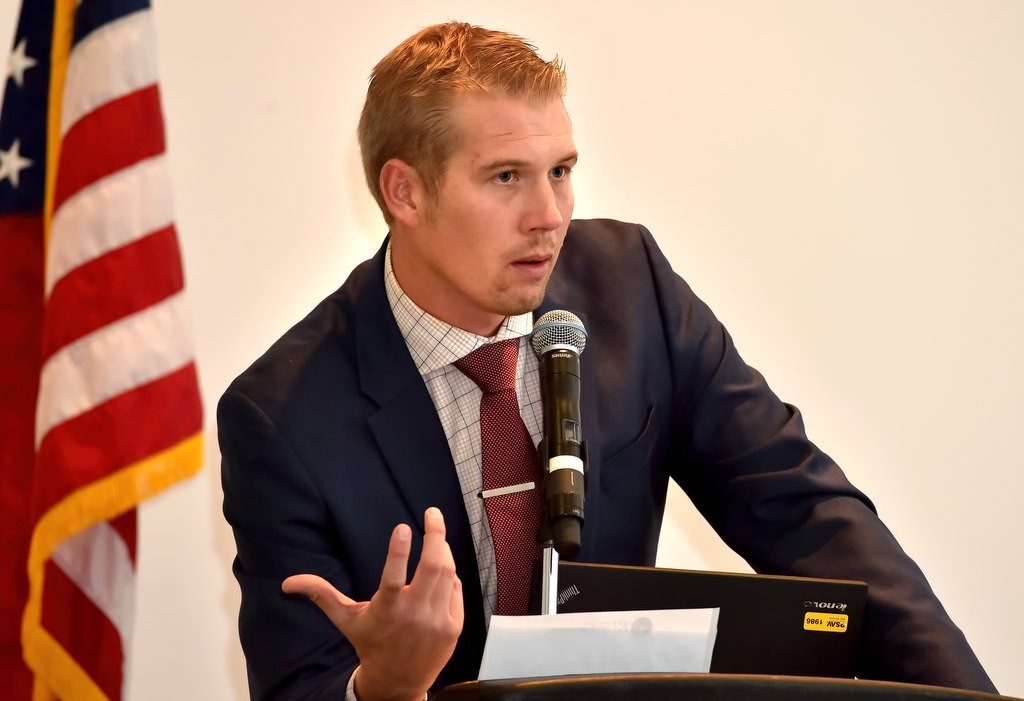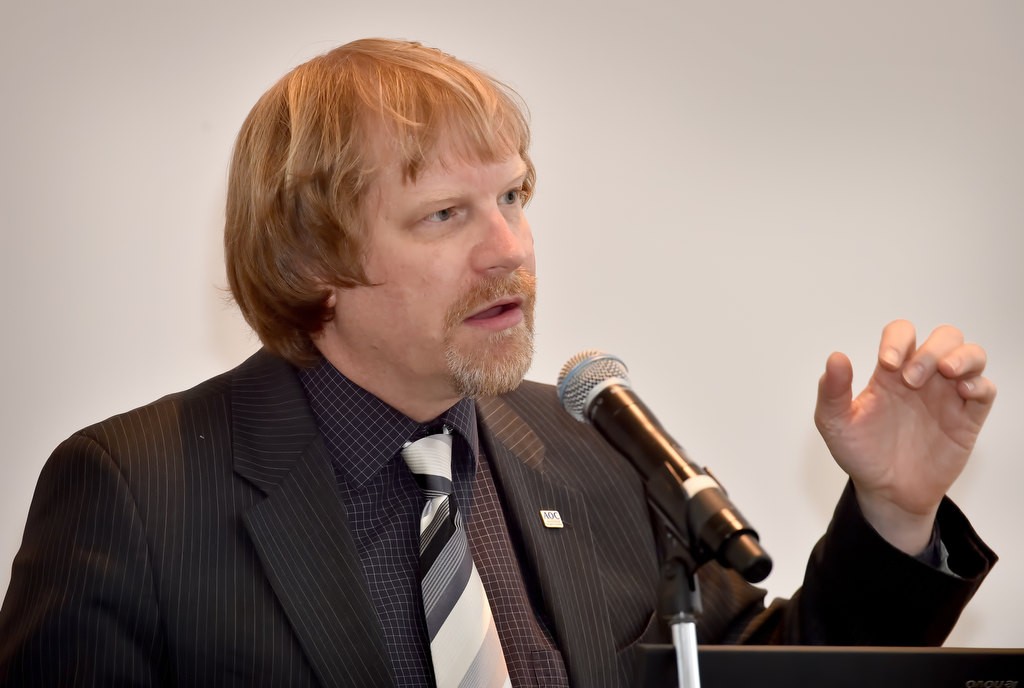Since recreational marijuana use became legal in Colorado in 2013, the state has seen spikes in pot use among young people, traffic fatalities involving drivers under the influence of cannabis, and homelessness, a police chief from that state said Tuesday.
John Jackson, chief of police of Greenwood Village, a suburb of Denver, was among a seven-member panel organized by Anaheim Police Chief Raul Quezada to discuss Proposition 64, California’s Adult Use of Marijuana Act.
The initiative goes before voters on Nov. 8 and if approved, recreational marijuana use would be legal in California.
Moderated by Chief Ken Corney, president of the California Police Chiefs’ Association, the panel discussion took place Oct. 4 at the Anaheim Convention Center and included perspectives from experts in law enforcement, public health, law-making and the cannabis industry.

Lauren Michaels, the legislative affairs manager for the California Police Chiefs’ Association, takes questions from the audience during a panel discussion on Prop 64, Proposition 64, California’s Adult Use of Marijuana Act. Behind her is Chief John Jackson of the Greenwood Village (CO) Police Department. Photo by Steven Georges/Behind the Badge OC
“There are lot of people who think it is going well in Colorado,” Jackson said. “It is not.”
Speaking in favor of Prop. 64, panelist Nate Bradley, co-founder and executive director of the California Cannabis Industry Association, said if recreational use of marijuana was legal, the state would get public safety and economic benefits.
“The reality is, we spend a lot of money supporting marijuana prohibitions,” said Bradley, a former police officer. “In my years in law enforcement, what I saw was that literally every dollar we spent sitting in an office or cutting down a (pot) plant is an hour not being spent to go after child predators, rapists, human traffickers. If we can focus our money on that, you will start to see a public safety benefit increase from that.”
The increase in tax revenue would also help pay for more police officers, Bradley said.

Chief John Jackson of the Greenwood Village (CO) Police Department talks about his department’s experience after Colorado legalized the sale of recreational marijuana. Behind him is Attorney Robert Bovett of the Oregon Counties Legal Counsel.
Photo by Steven Georges/Behind the Badge OC
“It comes down to one basic question,” he said. “Who do we want to sell this product? It is already being sold. Instead of gang bangers selling it, we will be dealing with people in suits.”
Chief Jackson disagreed and said his city has not seen the extra money that was promised in Colorado’s recreational marijuana initiative.
Jackson also challenged Prop. 64’s assertion that legalizing marijuana use will incapacitate the black market and prevent illegal diversion of marijuana from California to other states.
“That is not true,” Jackson said. “We have proven that is not the case.”
In fact, Jackson said, criminal organizations are moving into Colorado to produce and then illegally exporting marijuana to other states.
Also, much of the $135 million in tax revenue has been offset by the cost of enforcing and regulating Colorado’s cannabis industry, the chief said.
Of Colorado’s DUI arrests, 77 percent of the arrestees had THC, the mind-altering ingredient in cannabis, in their system, Jackson said.

John Schellin asks about the local effect Prop. 64 would have if passed during a panel discussion at the Anaheim Convention Center on the marijuana initiative.
Photo by Steven Georges/Behind the Badge OC
Traffic fatalities involving drivers who’ve tested positive for THC have also risen, he said.
“I don’t think that is a coincidence,” Jackson said.
Panelist Ben Cort, director of professional relations at the Center for Dependency, Addiction and Rehabilitation at the University of Colorado Health System, said today’s marijuana products such as edibles and butane hash oil are produced with extremely high concentrations of THC.
“It is not what you smoked in the ’70s,” said Cort, himself a recovering addict. “It’s so much stronger than anything we’ve seen before. It’s about THC being delivered into your body any way they can.”
Also, the notion that marijuana is not addictive is a myth, Cort said, and users who stop experience painful physical withdrawal symptoms.
Other panelists included Chief Justin Nordhorn of the Washington State Liquor and Cannabis Board, Attorney Robert Bovett of the Oregon Counties Legal Counsel and Lauren Michaels, the legislative affairs manager for the California Police Chiefs’ Association.
The panelists praised Quezada for his proactive approach to examine the issue.
“As chief of police, it is important and valuable to me, as I develop policing strategies, that all segments of the community are well versed in changes in laws, especially laws that have far-reaching impacts in our neighborhoods, schools, businesses and open spaces,” Quezada said.

Nate Bradley, executive director of the California Cannabis Industry Association, talks during the panel discussion. Next to him (from left) is moderator Chief Ken Corney, Ben Cort, Lauren Michaels, Chief John Jackson, Robert Bovett and Chief Justin Nordhorn.
Photo by Steven Georges/Behind the Badge OC

Ben Cort, an addiction and recovery expert from Colorado, talks about the his state’s experience with the legalization of recreational marijuana.
Photo by Steven Georges/Behind the Badge OC
 Behind the Badge
Behind the Badge





